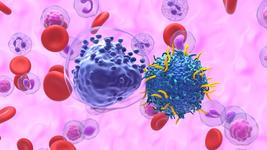The FDA Has Cleared the First Clinical Trial Application for a Prime Editor
CMN Intelligence - The World’s Most Comprehensive Intelligence Platform for CRISPR-Genomic Medicine and Gene-Editing Clinical Development
Providing market intelligence, data infrastructure, analytics, and reporting services for the global gene-editing sector. Read more...
US-based Prime Medicine announced on Monday that the FDA has cleared its IND application for PM359 for the treatment of chronic granulomatous disease (CGD), a rare, inherited, immune deficiency characterised by increased susceptibility to bacterial, mycobacterial and fungal infections.
This move makes PM359 the first prime editor to enter the clinic, and enables Prime Medicine to initiate its global Phase 1/2 clinical trial in the United States.
CGD arises through mutations in the NADPH oxidase complex
CGD is estimated to occur in 1 in 200,000 to 250,000 individuals worldwide. Symptoms typically begin in early childhood and if undiagnosed or untreated, may be fatal. In some cases, CGD can lead to autoimmune conditions affecting the bowel, soft tissues, or the urinary and digestive tracts.
The disease arises through mutations in any one of the genes that encode the subunits comprising the NADPH oxidase complex, which is indispensable for phagocytosis of pathogens, particularly by neutrophils. Mutations typically occur in the following genes: CYBA, CYBB, NCF1, NCF2, CYBC1, or NCF4 genes. CGD is categorised into five types, distinguished by the associated genetic variant.
Treating CGD with ex vivo prime-edited autologous haematopoietic stem cells
PM359, which is Prime Medicine's first product candidate within its haematology and immunology portfolios, targets the p47phox variant of CGD, which arises through mutations in the NCF1 gene.
It is currently possible to cure CGD with via transplantation with donor haematopoietic stem cells (HSCs). However patients who receive this treatment run the risks of developing graft-versus-host disease and graft failure, and access to suitable donors is a challenge.
PM359 addresses the limitations of conventional HSC transplantation by prime editing patients' own HSCs (i.e. autologous) ex vivo to correct a high percentage of cells that harbour the disease-causing mutation. Pre-clinical studies of PM359 demonstrated that edited cells could repopulate the bone marrow and restore the function of the NADPH oxidase complex.
PM359 has received rare paediatric drug designation and orphan drug designation from the FDA.
What is prime editing?
Prime editing combines the powerful DNA-scanning and sequence-identification capabilities of the CRISPR-Cas9 system with a reverse transcriptase enzyme, which uses an RNA template to synthesise a new single-strand DNA sequence and insert it into the DNA. Prime editing is considered to have a very desirable safety profile when compared to conventional CRISPR-Cas9-mediated gene editing approaches, because it allows for targeted DNA editing without the intentional generation of DNA double-strand breaks.
Learn more about how prime editing works and how it is used in our technical explainer:
The PM359 clinical trial
According to a press release published by Prime Medicine, the Phase 1/2 clinical trial of PM359 will be a multi-national trial designed to assess the safety, biological activity and preliminary efficacy of PM359 in adult and paediatric study participants. Initial study participants will be adults with stable disease. If safety and biological activity are demonstrated in this cohort, the study is designed to enroll participants with active infection or severe inflammation as well as adolescent and paediatric participants. Participants will be followed for safety, including engraftment and reconstitution of the hematopoietic system, early biological markers of restored immune function, and long-term resolution and prevention of infectious and inflammatory complications of CGD. Prime Medicine expects to report initial clinical data from the study in 2025.
Prime Medicine's PM359 trial is the second gene-editing clinical trial to be approved for CGD patients. The National Institute of Allergy and Infectious Diseases (NIAID) in the United States is sponsoring an unrelated Phase 1/2 trial to determine the safety and efficacy of a single infusion of base-edited autologous haematopoietic stem and progenitor cells (HSPCs) for the treatment of X-linked chronic granulomatous disease (X-CGD). NIAID's trial, which is currently enrolling by invitation, will assess the therapeutic benefit of base-editor-mediated correction of CYBB missense gene mutations (eg, CYBB c.676C>T). Read more about that trial here.
As always, we will provide updates on the studies discussed in this article as they emerge. For a complete overview of clinical trial approvals and updates, check out CRISPR Medicine News' Clinical Trials Database.
To get more CRISPR Medicine News delivered to your inbox, sign up to the free weekly CMN Newsletter here.
Tags
ArticleNewsClinical News UpdatesChronic Granulomatous Disease (CGD)Prime editorsPrime Medicine
CLINICAL TRIALS
Sponsors:
Base Therapeutics (Shanghai) Co., Ltd.
Sponsors:
Base Therapeutics (Shanghai) Co., Ltd.







